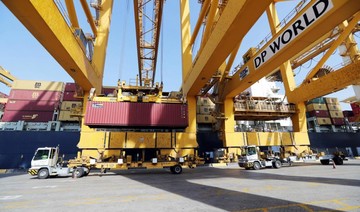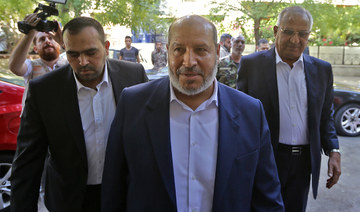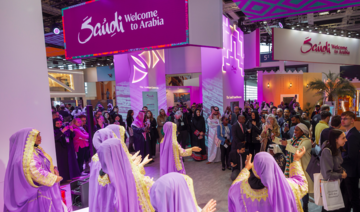NEW DELHI: India’s antitrust watchdog has ordered Dubai’s DP World and Denmark’s A.P. Moller-Maersk and to withdraw certain customer adviseries which it said could hamper growth of the country’s largest container port in Mumbai, a document seen by Reuters showed.
The Competition Commission of India (CCI) last year ordered a probe into suspected antitrust violations by DP World and Maersk units at the terminals they operate at state-owned Jawaharlal Nehru Port Trust (JNPT).
Handling 66 million tons of cargo in the last fiscal year to March, JNPT is critical to India’s international trade. The port handles more than half of India’s traffic in shipping containers each year.
The probe was ordered as the CCI found merit in a complaint filed by Singapore’s PSA International, which alleged the rival duo had created barriers to hinder the growth of PSA’s terminal by colluding on certain charges they levy at the port.
Though the terminal operators handle each other’s containers to help boost the port’s efficiency, PSA had alleged that DP World and Maersk last year issued adviseries aimed at discouraging port users from sending PSA’s containers to their terminals.
In an order issued by the CCI on Jan. 15, the watchdog ordered Maersk and DP World units to withdraw those adviseries, saying it “smacks of anti-competitive” conduct.
The adviseries, if not withdrawn, would cause “irretrievable damage or losses” not only to PSA, and would not augur well for the port’s development, according to the order. It has not been made public.
“This is likely to generate unwarranted uncertainty, chaos, discontent and anxiety among shipping lines and customers,” the CCI said.
The order is only an interim measure, and the wider probe continues.
A DP World spokesperson said the company had not received any such order from the Indian watchdog, but it was “committed to ensuring” it complies with all laws.
A.P. Moller-Maersk, the world’s biggest container shipping group, did not respond to queries. PSA, which is owned by Singapore government-owned investment fund Temasek Holdings, declined to comment.
The antitrust dispute at the JNPT is based on so-called inter-terminal transfers.
Under the system, freight trains arriving at JNPT typically carry containers destined for several terminals, but stop at just one that handles all the cargo on a given day. Other operators then collect their containers by truck for loading at their own terminals. A similar procedure is followed, in reverse, when imported containers are unloaded.
DP World’s advisory had said the inter-terminal operations with PSA were “inefficient and unviable.” Maersk had said its terminal “shall not be responsible” for handling containers to and from PSA-terminal bound trains.
Both the companies denied PSA’s allegations while arguing to the CCI that the adviseries were based on “commercial justifications,” the order said.
Units of Maersk, DP World and PSA operate four of the JNPT port’s five terminals, with the fifth owned by the government. The PSA terminal, inaugurated in February, is planned to be the largest, expected to nearly double JNPT’s capacity.
India watchdog orders DP World unit to withdraw some notices to clients at Mumbai port
India watchdog orders DP World unit to withdraw some notices to clients at Mumbai port
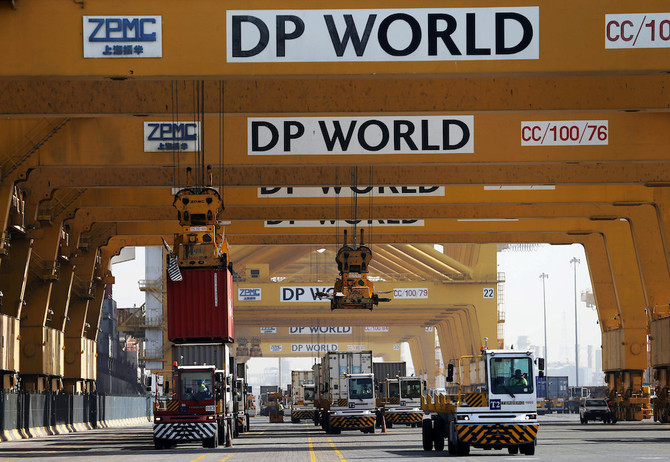
- India has been investigating antitrust violations at Mumbai port
- DP World, Maersk unit asked to withdraw some customer adviseries
Saudi Aramco and China’s Rongsheng explore JV in petrochemicals
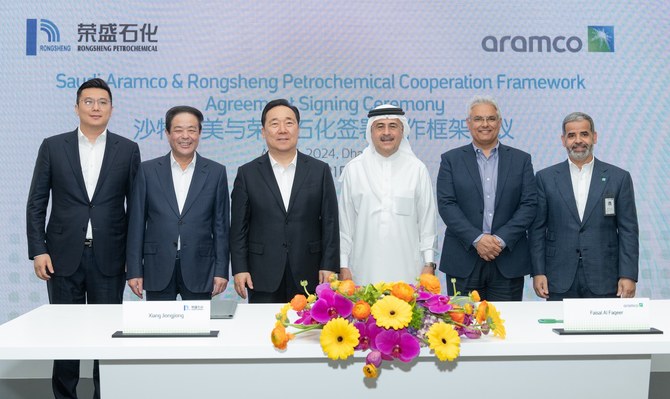
RIYADH: Saudi-Chinese investments are set to strengthen as Aramco explores a joint venture with Rongsheng Petrochemical Co. to advance its liquids-to-chemicals strategy.
According to a press statement, this joint venture is expected to be established in Saudi Aramco Jubail Refinery Co., also known as SASREF.
Located in Jubail Industrial City within the Kingdom, the facility currently processes crude oil into petroleum products with a production capacity of 305,000 barrels per day.
Rongsheng recently signed a cooperation framework agreement to explore the potential acquisition of a 50 percent stake in SASREF.
The agreement also lays the groundwork for the development of a liquids-to-chemicals expansion project at SASREF. Additionally, the press statement mentioned Aramco’s potential acquisition of a 50 percent stake in Rongsheng affiliate Ningbo Zhongjin Petrochemical Co.
Aramco Downstream President, Mohammed Y. Al-Qahtani, said: “These discussions highlight our ambition to advance our liquids-to-chemicals strategy with strategic partner Rongsheng, both in the Kingdom of Saudi Arabia and China.”
He added: “In building on our existing relationship, we aim to advance our expansion in a key geography and attract new investment to the Saudi downstream sector.”
In July 2023, Aramco acquired a 10 percent interest in Rongsheng through its subsidiary Aramco Overseas Co., based in the Netherlands.
Rongsheng, in turn, holds a 100 percent equity interest in ZJPC, which operates an aromatics production complex and expresses interest in a joint venture focused on producing purified terephthalic acid.
Earlier in April, Saudi Aramco disclosed that it is in talks to acquire a 10 percent stake in China’s Hengli Petrochemical, aiming to strengthen Aramco’s growing downstream presence in the Asian country.
In a statement, Saudi Aramco mentioned signing a memorandum of understanding for the proposed transaction, pending regulatory approvals.
Qatar launches national strategy to boost renewable energy mix

RIYADH: The use of solar power and other renewable energy sources is set to boost with the launch of a comprehensive strategy by the Qatar General Electricity and Water Corp.
The utility, also known as Kahramaa, formulated the Qatar National Renewable Energy Strategy to add renewable sources to its energy mix.
The initiative, developed in coordination with 22 key energy actors, aligns with Qatar’s commitment to a sustainable future and the goals outlined in the Qatar National Vision 2030 and the Third Qatar National Development Strategy 2024-2030, according to a report issued by Qatar News Agency.
With the annual production of more than 2,000 kilowatt hours of solar power per square meter, Qatar is one of top countries with the highest potential for producing this clean form of energy.
As per the strategy, Qatar aims to expand its renewable power generation capacity to approximately 4 gigawatts by 2030, with distributed solar generation contributing around 200 megawatts.
This distributed approach will decentralize power generation, ease the burden on the centralized grid, and enhance the overall energy resilience of the nation.
The launch of the strategy marks a crucial step toward redefining Qatar’s energy landscape as it promises substantial economic, environmental, and security benefits.
The plan is projected to reduce the average cost of electricity generation by 15 percent by 2030 through cost-effective renewable solutions.
In terms of its environmental impact, the strategy supports the reduction of carbon emissions, targeting a 10 percent cut in annual emissions from the power sector and a 27 percent reduction in CO2 intensity per unit of electricity produced.
From an energy security perspective, diversifying power sources is crucial as the strategy emphasizes the importance of maintaining system reliability during the transition to renewables.
To this end, the strategy proposes a balanced mix of large-scale renewable projects and efficient thermal generation using natural gas.
Kahramaa’s responsibilities under QNRES include regulating renewable energy practices, issuing licenses, monitoring compliance, executing detailed deployment programs, managing stakeholder interactions, and supporting research and innovation initiatives.
Moreover, the utility company has begun accepting applications for accredited solar panels and inverters, setting the stage for a comprehensive rollout of distributed renewable energy systems.
The strategy also included the introduction of net-billing for distributed renewable generation, allowing prosumers to sell surplus electricity back to the grid at fixed prices.
This system employs bidirectional meters to measure both consumption and surplus electricity exported to the grid, with credits applied to consumers’ accounts to offset future consumption costs.
Pakistan appoint Kirsten, Gillespie head coaches for white-ball, Test formats
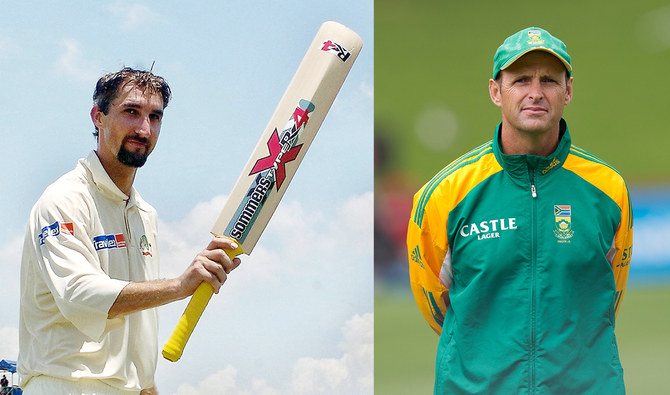
- Former South African batter Gary Kirsten coached Inda to World Cup glory in 2011, number 1 spot in Test format
- Former all-rounder Azhar Mahmood confirmed as Pakistan’s assistant coach in all three formats of the game
ISLAMABAD: The Pakistan Cricket Board (PCB) on Sunday announced it had roped in Gary Kirsten as the national squad’s new head coach for limited-overs cricket and Jason Gillespie for the Test format, with less than two months to go before the ICC T20 World Cup 2024 kicks off in the West Indies and USA.
Pakistan were without head coaches for both formats of the game after former team director Mickey Arthur and coaches Grant Bradburn and Andrew Puttick were transferred to the National Cricket Academy (NCA) in Lahore after a change in their portfolios in November 2023.
The trio left their respective positions in January this year, months after Pakistan’s abysmal performance in last year’s 50-over World Cup in India.
“The three appointments have been made for a two-year period following a recruitment process,” the PCB said in a statement, adding that former cricketer Azhar Mahmood has been confirmed as assistant coach in all three formats of the game.
“I extend my congratulations to Jason Gillespie and Gary Kirsten on their appointments as the red and white-ball head coaches of the Pakistan men’s cricket team, respectively,” PCB Chairman Mohsin Naqvi said at a news conference on Sunday.
“Their stellar track records precede them, and I warmly welcome them to the Pakistan cricket family.”
Kirsten, 56, is a former South African top-order batter who played 101 Test matches and 185 ODIs from 1993-2004 in which he scored a total of 14,087 runs and 34 centuries.
The 56-year-old former South Africa top-order batter played 101 Tests and 185 ODIs from 1993-2004 in which he accumulated a total of 14,087 runs with 34 centuries.
Kirsten coached India from 2008-2011 and helped them win the ICC Men’s Cricket World Cup 2011 title and attain the number one position on the ICC Test Team Rankings.
He also coached South Africa men’s cricket team from 2011-2013 and inspired them to the number one position on the ICC Test Team Rankings.
Kirsten has coached Indian Premier League (IPL) teams Delhi Capitals and Royal Challengers Bengaluru, and is presently the batting coach and mentor of Gujarat Titans, who won the 2022 IPL tournament.
“It’s a tremendous honor to be entrusted with the responsibility of coaching the Pakistan men’s national team in white-ball cricket and to rejoin the international cricket arena after some time,” Kirsten told PCB Digital.
“I eagerly anticipate this opportunity and aim to contribute positively to the Pakistan men’s national team in limited-overs cricket.”
Kirsten will take charge of the side immediately after completing his assignment in the IPL. During his tenure, besides the upcoming ICC Men’s T20 World Cup 2024 and other bilateral white-ball series, Kirsten will also be in charge of the side for next year’s ICC Champions Trophy 2025 in Pakistan, ACC T20 Asia Cup 2025 and the ICC Men’s T20 World Cup 2026 in India and Sri Lanka.
Meanwhile, former Australia fast bowler Gillespie will assume responsibilities for Pakistan’s ICC World Test Championship fixtures against Bangladesh (at home in August), which will be followed by Tests against England (at home in October) and South Africa (away in December) in the 2024-25 season.
“I am grateful to the PCB for their faith in my abilities and giving me the honor of coaching one of the most highly-regarded and talented cricket teams in the traditional format of the sport,” Gillespie told PCB Digital.
“Leading the Pakistan cricket team is a big achievement for any coach, given its rich legacy and passionate fan base.”
Gillespie said he wanted to win Tests for Pakistan, which is why he had taken up the coaching assignment.
“Within Pakistan we have a number of high-quality fast bowlers and being able to utilize them will be a key part of any success we enjoy,” Gillespie said.
“But we have quality in all departments – pace, spin, batting and keeping. We have all bases covered. It is exciting to know we have that talent and I am looking forward to working with such talented players.”
Gillespie, 49, has played 71 Tests, 97 ODIs and 1 T20I from 1996-2006. He has taken a total of 402 wickets and accumulated 1,531 runs. The former pacer was part of the Australia squad that won the ICC Men’s Cricket World Cup 2003 in South Africa.
Gillespie has coached Yorkshire County Cricket Club to back-to-back County Championship titles in 2014 and 2015 and is credited with developing England stars Jonny Bairstow, Gary Ballance and Joe Root during his time with Yorkshire.
A top Qatari official urges Israel and Hamas to do more to reach a ceasefire deal
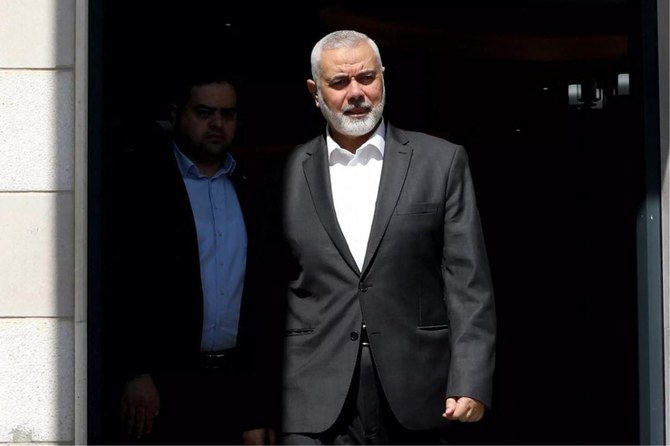
- There is growing international pressure for Hamas and Israel to reach a ceasefire deal and avert an Israeli attack on Rafah
- Hamas delegation to visit Cairo on Monday for ceasefire talks
TEL AVIV: A senior Qatari official has urged both Israel and Hamas to show “more commitment and more seriousness” in ceasefire negotiations in interviews with Israeli media, as pressure builds on both sides to move toward a deal that would set Israeli hostages free and bring potential respite in the nearly 7-month-long war in Gaza.
The interviews with the liberal daily Haaretz and the Israeli public broadcaster Kan were published and aired Saturday evening. They came as Israel still promises to invade Gaza’s southernmost city of Rafah despite global concern for hundreds of thousands of Palestinians sheltering there and as the sides are exchanging proposals surrounding a ceasefire deal.
Qatar, which hosts Hamas headquarters in Doha, has been a key intermediary throughout the Israel-Hamas war. Along with the US and Egypt, Qatar was instrumental in helping negotiate a brief halt to the fighting in November that led to the release of dozens of hostages.
The sides have held numerous rounds of negotiations since, none of which produced an additional truce. In a sign of its frustration, Qatar last week said it was reassessing its role as mediator.
In the interviews, Qatar’s Foreign Ministry spokesperson Majed Al-Ansari expressed disappointment in both Hamas and Israel, saying each side has made its decisions based on political interests and not with the good of civilians in mind.
“We were hoping to see more commitment and more seriousness on both sides,” he told Haaretz.
He did not reveal details of the current state of the talks, other than to say they have “effectively stopped,” with “both sides entrenched in their positions.”
“If there is a renewed sense of commitment on both sides, I’m sure we can reach a deal,” he said.
The Israeli journalists conducted the interviews in Qatar, which has no formal diplomatic ties with Israel.
Relations between Qatar and Israel have been strained throughout the war, as some politicians in Israel, including Prime Minister Benjamin Netanyahu, have criticized Qatar for not putting enough pressure on Hamas.
Israeli legislators have also cleared the way for the country to expel Al Jazeera, the Qatar-owned broadcaster.
Al-Ansari’s remarks came after an Egyptian delegation had discussed with Israeli officials a “new vision” for a prolonged ceasefire in Gaza, according to an Egyptian official, who spoke on condition of anonymity to freely discuss the developments.
Hamas meanwhile said Saturday it was reviewing a new Israeli proposal for a ceasefire, which came in response to a Hamas proposal from two weeks ago.
A Hamas delegation will visit Cairo on Monday for Gaza ceasefire talks, a Hamas official who asked not to be named told Reuters, adding that the delegation will discuss the proposed ceasefire offered by mediators as well as Israel's response.
Negotiations earlier this month centered on a six-week ceasefire proposal and the release of 40 civilian and sick hostages held by Hamas in exchange for freeing hundreds of Palestinian prisoners in Israeli jails.
There is growing international pressure for Hamas and Israel to reach a ceasefire deal and avert an Israeli attack on Rafah.
A letter penned by US President Joe Biden along with 17 other world leaders urged Hamas to release the hostages immediately.
Hamas in recent days has released new videos of three hostages it holds, which appear to be meant to push Israel to make concessions.
Israel meanwhile has massed dozens of tanks and armored vehicles ahead of an expected offensive in Rafah, where more than half of Gaza’s 2.3 million population is seeking shelter. The planned incursion has raised global alarm because of concerns over potential harm to civilians. The troop buildup may also be a pressure tactic on Hamas in the truce talks.
Israel sees Rafah as Hamas’ last major stronghold and has vowed to attack the militant group there in its bid to destroy its military and governing capabilities.
The war was sparked with Hamas’ attack on Oct. 7 into southern Israel, which killed 1,200 people, mostly civilians, according to Israeli authorities, who say another 250 people were taken hostage. Hamas and other groups are holding about 130 people, including the remains of about 30, Israeli authorities say.
Israel’s retaliatory assault on Hamas has killed more than 34,000 people, most of them women and children, according to health authorities in Gaza, who do not distinguish between civilians and combatants in their tally. The Israeli military says it has killed at least 12,000 militants, without providing evidence to back the claim.
Vision 2030 and the evolution of Saudi Arabia’s hospitality sector

RIYADH: As Saudi Arabia embarks on its ambitious journey outlined in Vision 2030, the hospitality industry emerges as a pivotal player in the Kingdom’s economic diversification efforts.
The sector continues to evolve, with a focus on attracting international visitors and enhancing domestic tourism experiences.
In 2023, the Kingdom’s travel industry not only met but exceeded expectations, experiencing a staggering 58 percent growth in passenger arrivals. This prompted a substantial recalibration of its Vision 2030 ambitions.
Last year, Saudi Arabia increased its annual tourism target to 150 million visitors by 2030 after surpassing the original goal of 100 million, seven years ahead of schedule. This achievement was attributed to the country’s ongoing investment in infrastructure, tourism transformation, hospitality, and real estate, aligned with its vision objectives.
Through capital allocation in the tourism framework, promotion of cultural heritage, and encouragement of innovation in the hospitality sector, the nation aims to unleash the Kingdom’s tourism potential and establish the region as a premier global destination.
Since Saudi Arabia opened its doors to non-religious tourists for the first time in 2019, the service and accommodation industry has been infused with new life.
With the announcement of a variety of hotels, resorts, and tourist attractions, the sector is positioning itself to meet the growing demand.
To achieve this, the Kingdom aims to increase its hotel room inventory by 315,000, projecting a development expenditure of around $37.8 billion by 2030. This expansion will bring the overall inventory to nearly 450,000 rooms.
David Vely, the vice president of development for the Middle East and Africa at Club Med, emphasized that experts in the field have witnessed firsthand Saudi Arabia’s ongoing efforts and investments to fulfill the criteria needed to meet its destination development and tourism targets.
He said: “Firstly, world-class infrastructure, including international airports and an advanced highway network, is crucial to facilitate tourist travel. Secondly, a variety of tourist attractions — from historical sites and beautiful beaches to modern entertainment centers — are needed to attract visitors. Thirdly, quality service and memorable experiences, coupled with professional and warm hospitality, are essential to retain tourists and foster positive word-of-mouth.”
Vely added: “We have observed Saudi Arabia’s ongoing efforts and investments to successfully fulfill these three criteria and are confident in its ability to achieve — and surpass — the ambitious goals of Vision 2030.”
Alongside investments in tourism infrastructure, which encompass transportation networks, airports, roads, and recreational amenities, initiatives such as NEOM, the Red Sea Project, and Qiddiya are expected to further bolster the nation’s hospitality sector.
In September, NEOM’s mountains destination, Trojena, revealed plans to host two Marriott hotels — a JW and a W. These establishments are among the numerous international inns set to open at the artificial ski retreat, which is slated to host the Asian Winter Games in 2029. The resort is scheduled to welcome visitors and new residents in late 2026.
Meanwhile, Red Sea Global, the visionary developer wholly owned by Saudi Arabia’s Public Investment Fund, boasts a portfolio that includes two world-leading destinations announced by Crown Prince Mohammad bin Salman: The Red Sea and AMAALA.
Collectively, these developments aim to enhance Saudi Arabia’s luxury tourism and hospitality sustainability offerings, with a focus on protecting the natural environment and enhancing it for future generations.
Emphasizing the importance of environmental awareness in the hospitality sector, Shahbaz Tufail, the executive vice president of DAR Engineering, noted that it is “crucial” to incorporate sustainability into new undertakings.
“The ongoing development of new entertainment options, as well as aligning value and service propositions to the international travel palette, clearly demonstrates the intent of Vision 2030. To appeal to a broader audience, providers must align with global hospitality and travel trends such as ecotourism, wellness, smart hotels and sustainability,” he said.
As a cornerstone of the sector’s development, both Vely and Tufail further stressed the importance of training and education in attracting and retaining talent within the hospitality field.
In order for this to happen, the industry needs to offer competitive compensation and benefits packages to attract skilled professionals into hospitality, and invest in training programs to develop new talent and up-skill existing team members, as noted by Ramine Benham, vice president of development at Minor Hotel EMEA.
“Collaboration with educational institutions to offer internships and graduate training programs, as well as vocational training programs can also help in providing a pipeline of future talent. By implementing these measures, the hospitality industry will be able to ensure that they employ the best talent and furthermore retain these loyal individual,” he added.
The nation has already begun to take strides in this direction, with the announcement of multiple programs and initiatives.
In September of last year, the country’s Minister of Tourism, Ahmed Al-Khateeb, declared the opening of the Riyadh School for Tourism and Hospitality during the 2023 UN Tourism “World Tourism Day” celebrations in Riyadh.
Inaugurating the launch, Al-Khateeb said: “This school is a gift from the Kingdom of Saudi Arabia to the world because it will be open to everyone to enjoy the best training in tourism and hospitality.”
This initiative aims to revolutionize industry education by attracting the brightest minds and leveraging cutting-edge technologies in an innovative facility.
Similarly, in April, a partnership was announced between the Kingdom’s Ministry of Tourism and UN Tourism for the launch of a six-month training program tailored for institutions in Saudi Arabia specializing in the sector.
TedQual, a certification system designed by the body to evaluate a series of universally applicable criteria, will help further enhance the quality and training of relevant organizations in Saudi Arabia.
The UN-backed tourism education scheme is poised to elevate the training of Saudi workers, enabling them to deliver the best international standards in the Kingdom.
As the nation gears up to host Expo 2030 in its capital, talent retention becomes imperative to meet the anticipated surge in hotel occupancy rates, with both international and domestic travelers seeking accommodation during the bustling period.
Furthermore, the forum represents a transformative opportunity for Saudi Arabia’s hospitality sector, driving growth and investment.
“Investors are drawn to opportunities in hotel development and resort projects due to the sector’s potential for substantial returns on investment,” Vely said.
“Moreover, a thriving hospitality industry enhances the country’s overall attractiveness as an investment destination, strengthening confidence among foreign investors and contributing to the country’s economic growth and diversification efforts,” he added.
To support the sector’s growth, investment, and attractiveness, Riyadh is poised to host the Future Hospitality Summit, which will focus on the future of successful hotel and destination development in the Kingdom as part of the event’s agenda.
The forum, scheduled to take place from April 29 to May 1, will discuss key factors affecting tourism development and explore strategies for overcoming potential challenges to ensure government targets are met.


